
Disclaimer: I attended FOSDEM in Brussels last January. I should have written this weeks ago but better late than ever, right?

As you may know if you are reading this, FOSDEM is a not to be missed event about Free and Open Source Software (FOSS). By far, it is the most important gathering about FOSS in the planet. It's an unbeatable opportunity to attend great talks and workshops, but also to hang around with amazing people and top professionals.
The most impressive fact is that FOSDEM is organized by volunteers and everything is community driven, from each year tracks to their schedule. It's free to attend and there is no registration. You just need to show up :-)
This year, the usual huge numbers even increased (source: fosdem.org):
- 2 days
- more than 8,000 attendees
- 52 tracks in 28 different rooms
- 569 speakers
- 618 events (talks, workshops, panels, ...)
Apart from the main event during the weekend and the official Friday Beer Event (the mythic Delirium Café overcrowded with hackers from around the world), each year there are dozens Fringe events around FOSDEM during the previous days, totally independent but also related to FOSS and communities.
I had the opportunity to give a lightning talk in one of those fringe events: the Floss Community Metrics Meeting (FCM2). Let me bring here their own description:
This meeting is intended to be an open venue for community managers, DevRel managers, and FLOSS community experts to present ideas, tools, and analysis that the FLOSS community is already doing with FLOSS platforms. It is open to discuss about collaboration, synergies, etc. It will be organized to foster discussion, but will also focus on development of new tools, improvement of existing ones, and how to spread the knowledge about what is being done and can be done in this area
My talk was about measuring health and ethics in programming languages, a brief version focusing on the metrics aspects of my talk in the last Codemotion event about Governance in programming languages.
Time for @luiyo 's lightning talk at @flossmetrics about measuring health and ethics of programming languages :D pic.twitter.com/tEBhbLZed7
— Esther Lozano (@esloho) January 29, 2016
Let me summarize some of the other talks:
- Duane O'Brien (PayPal) talked about measuring velocity from the InnerSource point of view
- Sumana Harihareswara (Changeset Consulting) explained some of the usual mistakes measuring FOSS projects. I loved (and will use!) her explanation of the lamppost fallacy
- John Sullivan (Executive Director @ FSF) started explaining the FSF's mission ("all computer users must be able to do everything they need to do on any computer using only free software") and then how they use free software project metrics (even in non-software initiatives) to see if they progress towards their goal
- Ioana Chiorean (Mozilla Rep Mentor) told us about Mozilla's representatives program, how they work and how they measure their progress
- J. M. González-Barahona (Bitergia) showed us GrimoireLab, an impressive open source tool by Bitergia using (among other things) Perceval, Elastic Search, Python and Kibana
- Donnie Berkholz (451 Research) about another common mistake, comparing communities and projects that shouldn't be compared between them (OS vs editors vs frameworks vs ...)
- Dawn Foster (Univ. of Greenwich) showed us Gource, an impressive tool to visualize repos. I knew about it some years ago and it still has no rival in awesomeness, just look at this demo
- Jos Poortvliet (ownCloud) explained how they analyse their metrics: code commiters, ticket participants, discussion participants and so on
- Lauri Apple (Zalando) surprised me with Zalando's numbers: 17 million customers, +10,000 employees (+1,000 technologist) and more than 300 open source projects. Not so bad for an online fashion platform... She showed us Catwatch, their own open-source projects dashboard
- Jose Manrique Lopez (Bitergia) showed us the evolution of Cauldron, another fantastic tool from Bitergia to display the metrics behind Github repositories
- JJ Merelo (Univ. of Granada) described his problems with his own tool to rank Spanish users and repositories from Github
- Christoph Wickert (Fedora Project) showed us HyperKitty, a django-based tool to replace Pipermail as the default archiver for Mailman. Looked like a gigantic step ahead of its predecessor
- Kristof Van Tomme (Provonix) explained how they started with a tool to generate upgrade reports from Drupal sites in order to review the upgrade status of the site's modules, and ended with a daemon analyzing thousands of Drupal sites to get not only update reports, but lists of sites using a certain module, comparing modules and the demographic of their adoption and son on
TL;DR: it was worth it attending the event, totally, and not only because I was in the speaker roster (with excellent companions).
You can read about the rest of my FOSDEM here:





